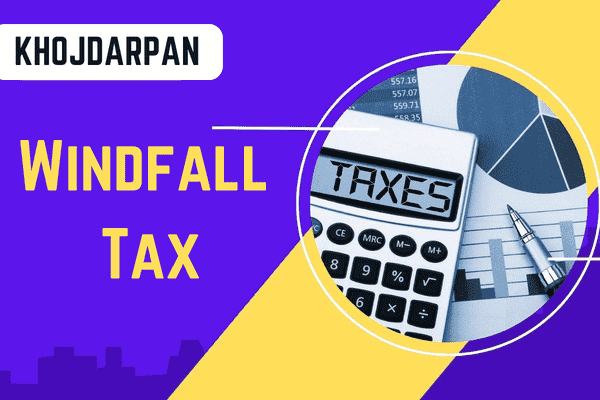Exploring Windfall Tax: Meaning, Impact, and Recent Developments
Introduction to Windfall Tax
Windfall tax is a term that has gained prominence in recent times, especially in discussions related to economic policies and taxation. It refers to a tax levied on unexpected profits or gains that exceed normal expectations. This tax is often imposed by governments to capture windfall profits arising from favorable circumstances such as a sudden increase in commodity prices or unexpected revenue surges.
Understanding Windfall Tax
What is Windfall Tax?
Windfall tax is essentially a means for governments to recoup additional revenue generated by certain sectors or industries due to unforeseen events or market conditions. It is typically imposed as a one-time levy on top of regular taxes and is aimed at redistributing wealth and addressing income inequality.
Windfall Tax Meaning in Hindi
In Hindi, windfall tax is often referred to as “अनुपात शुल्क” (Anupat Shulk), which translates to “proportionate tax.” This term reflects the idea that the tax is applied in proportion to the windfall gains obtained by individuals or entities.
Government Cuts Windfall Tax: Recent Developments
Recent developments have seen governments revisiting their policies regarding windfall tax. Some have opted to reduce or eliminate windfall taxes in certain sectors to stimulate economic growth and incentivize investment. These decisions are often influenced by broader economic considerations and political agendas.
Windfall Tax on Crude Oil
Impact on Crude Oil Industry
One notable application of windfall tax is in the crude oil industry. When oil prices experience a sudden surge due to geopolitical tensions, supply disruptions, or other factors, governments may impose a windfall tax to capture the excess profits earned by oil companies.
Windfall Tax on Crude Oil: Latest News
In recent years, there have been discussions and debates surrounding the imposition of windfall tax on crude oil. Governments in oil-producing countries have grappled with the decision to impose such taxes to shore up revenues amidst fluctuating oil prices and economic uncertainties.
Windfall Tax in India
Historical Context and Implementation
India has a history of implementing windfall taxes in various sectors, including oil and gas. These taxes are often introduced as temporary measures to address specific economic challenges or revenue shortfalls.
Current Scenario and Legal Framework
The current legal framework in India allows for the imposition of windfall taxes under certain conditions. However, the specific criteria and rates applicable to such taxes vary depending on the sector and prevailing economic circumstances.
Windfall Tax News Today
Updates and Analysis
Stay updated with the latest news and developments regarding windfall tax through reliable sources. Analyze how these developments impact different sectors and industries, including the share market and overall economic stability.
Windfall Tax and Its Impact
Impact on Share Market
The imposition of windfall tax can have significant implications for the share market. Investors closely monitor government policies and taxation measures to assess their potential impact on company profits and stock prices.
Economic Implications
Windfall tax policies can affect economic growth, investment decisions, and income distribution. It is essential to consider the broader economic implications of such taxes and their long-term effects on various stakeholders.
Advantages and Disadvantages of The Windfall Tax
The windfall tax serves to ensure that companies contributing to sudden increases in profit pay a fair share of their earnings, helping the government offset losses incurred during financial crises. Additionally, it encourages reinvestment of profits into the company, fostering innovation and benefiting society at large.
However, windfall taxes can also pose challenges, particularly for high-earning industries like crude oil companies. While these companies play a vital role in the economy, windfall taxes are imposed to mitigate price increases for consumers, ensuring affordability of goods and services.
In conclusion, windfall tax remains a contentious issue, with its impact on various sectors and industries subject to ongoing scrutiny. While it serves as a means for governments to capture excess profits and redistribute wealth, its implementation and effectiveness continue to be debated.
Government Cuts Windfall Tax on Crude Oil
Recent updates indicate adjustments in windfall tax rates, particularly in the crude oil sector. While the tax on petrol, diesel, and aviation turbine fuel remains at zero, the windfall tax on crude oil has been reduced from Rs 6,400 per tonne to Rs 4,100 per tonne, effective from May 2, 2023.
The windfall tax on crude oil production and export products was initially estimated to generate significant revenue. However, revisions were made to tax rates based on fluctuations in international oil prices. For instance, on August 19, 2022, diesel export taxes increased, while taxes on domestic crude oil sales were reduced.
Read more – Is BlackRock (BLK) a Lucrative Investment Opportunity? Expert Analysis
FAQs on Windfall Tax
1. What is Windfall Tax and how does it work?
Windfall tax is a levy imposed by governments on unexpected profits or gains that exceed normal expectations. It is typically applied as a one-time tax on top of regular taxes.
2. What is the significance of Windfall Tax in the Indian context?
In India, windfall tax is often used as a means to capture excess profits generated by certain sectors, such as oil and gas, during periods of favorable market conditions.
3. How does Windfall Tax affect the crude oil industry?
The imposition of windfall tax on crude oil can impact oil companies’ profitability and investment decisions. It aims to redistribute wealth and address income inequality.
4. What are the recent developments regarding Windfall Tax in India?
Recent developments include discussions on revisiting windfall tax policies and their implications for economic growth and investment.
5. How does Windfall Tax impact the share market?
Windfall tax policies can influence investor sentiment and stock prices, particularly in sectors directly affected by the tax. Investors assess the potential impact on company profits and adjust their investment strategies accordingly.
In conclusion, windfall tax is a complex taxation concept with significant implications for various sectors and industries. Stay informed about recent developments and their impact on the economy and financial markets. Understanding the nuances of windfall tax is essential for making informed investment decisions and navigating economic uncertainties.
Discover more from KHOJ DARPAN
Subscribe to get the latest posts sent to your email.





One thought on “Exploring Windfall Tax: Meaning, Impact, and Recent Developments”